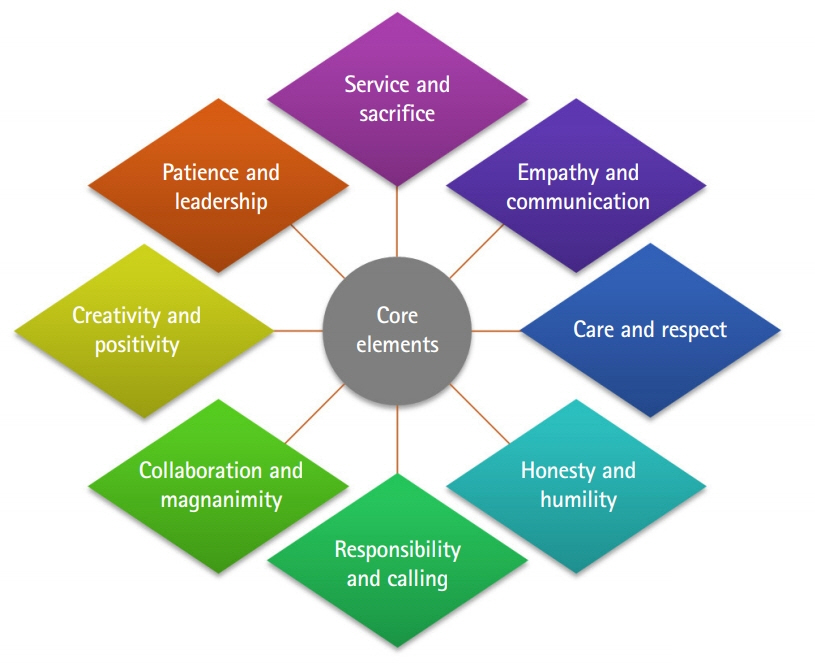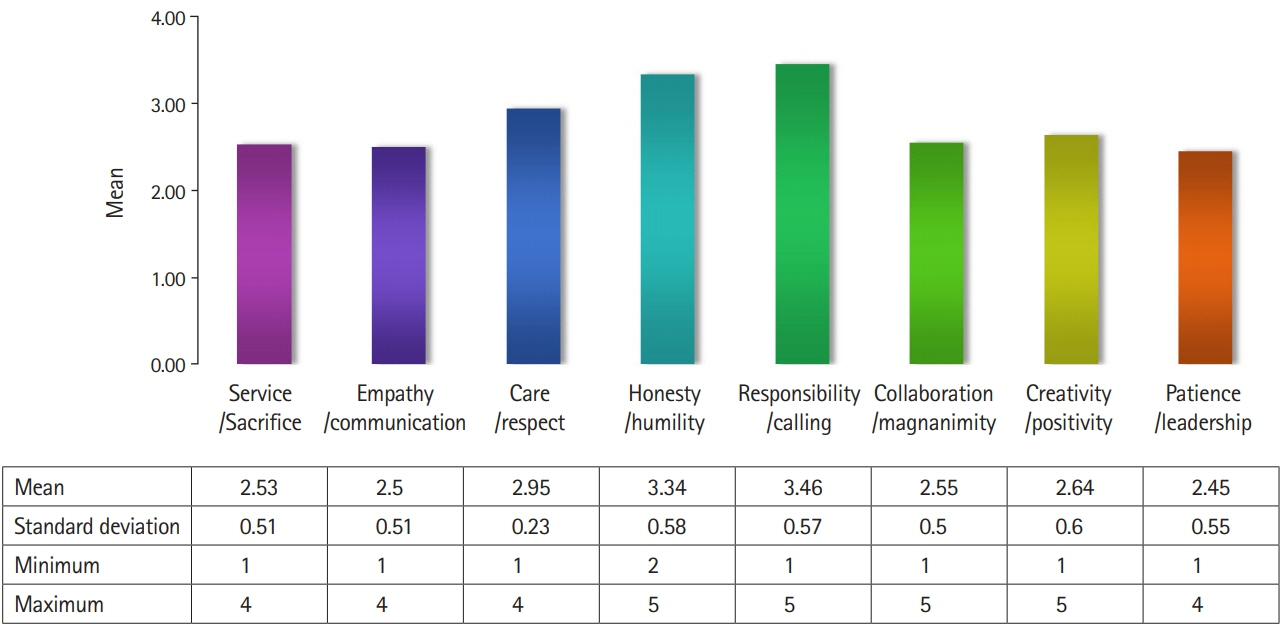J Educ Eval Health Prof.
2019;16:21. 10.3352/jeehp.2019.16.21.
Identification and evaluation of the core elements of character education for medical students in Korea
- Affiliations
-
- 1Institute of Medical Education, Hallym University College of Medicine, Chuncheon, Korea
- 2Korea Institute for Research in the Behavioral Sciences, Seoul, Korea
- KMID: 2502178
- DOI: http://doi.org/10.3352/jeehp.2019.16.21
Abstract
- Purpose
Medicine requires uniquely high levels of motivation, ethics, and altruistic values and behavior. This study was conducted to redefine character education in medical education and to identify and evaluate the core elements of physicians’ character.
Methods
A 3-round Delphi survey was conducted among professors of medical education, physicians, experts from nursing schools, and a head nurse in Korea. A consultant group (CG) was formed to prepare the Delphi survey, discuss the research results, and set directions for future initiatives. The 3 rounds of the Delphi survey were conducted between September 2018 and February 2019.
Results
From the first-round Delphi survey, which inquired about the 10 key character elements required for medical students, a total of 420 elements were collected. The top 10 categories were selected and classified. After the second and third rounds of the Delphi consensus process and a series of CG meetings, the following 8 core categorical elements were identified: service and sacrifice, empathy and communication, care and respect, honesty and humility, responsibility and calling, collaboration and magnanimity, creativity and positivity, and patience and leadership. The average score of medical graduates for the core elements ranged from 2.45 to 3.46 (standard deviation, 0.23–0.60) on a 5-point Likert scale.
Conclusion
Eight core categorical elements of the character of medical students were identified. The results of this study can be used as a reference for establishing the goals and desired outcomes of character education at the level of undergraduate or graduate medical education.
Keyword
Figure
Cited by 2 articles
-
Core elements of character education essential for doctors suggested by medical students in Korea: a preliminary study
Yera Hur, Keumho Lee, Sun Huh
J Educ Eval Health Prof. 2020;17:43. doi: 10.3352/jeehp.2020.17.43.Definition of character for medical education based on expert opinions in Korea
Yera Hur, Sun Huh
J Educ Eval Health Prof. 2021;18:26. doi: 10.3352/jeehp.2021.18.26.
Reference
-
References
1. Kim J, Kim IH, Yang SS, Lee SH. Korea Educational Development Institute’s public opinion survey (RR2014-24). Jincheon: Korean Educational Development Institute;2014.2. Lourinho I, Moreira A, Mota-Cardoso R, Severo M, Ferreira MA. Associations between the big five personality traits and a medical school admission interview. Acta Med Port. 2016; 29:796–802. https://doi.org/10.20344/amp.8390.
Article3. Patterson F, Zibarras LD. Selecting for creativity and innovation potential: implications for practice in healthcare education. Adv Health Sci Educ Theory Pract. 2017; 22:417–428. https://doi.org/10.1007/s10459-016-9731-4.
Article4. Heo YJ. Doctors’ competency and empowerment measures desired by the state and society. J Korean Med Assoc. 2014; 57:121–127. https://doi.org/10.5124/jkma.2014.57.2.121.
Article5. Yoo SH, Joo YS, Lee SH. Graduate and postgraduate medical ethics education. J Korean Med Assoc. 2017; 60:24–31. https://doi.org/10.5124/jkma.2017.60.1.24.
Article6. Kotzee B, Ignatowicz A, Thomas H. Virtue in medical practice: an exploratory study. HEC Forum. 2017; 29:1–19. https://doi.org/10.1007/s10730-016-9308-x.
Article7. Leffel GM, Oakes Mueller RA, Ham SA, Karches KE, Curlin FA, Yoon JD. Project on the good physician: further evidence for the validity of a moral intuitionist model of virtuous caring. Teach Learn Med. 2018; 30:303–316. https://doi.org/10.1080/10401334.2017.1414608.
Article8. Hur Y, Cho AR, Choi CJ. Medical students’ and patients’ perceptions of patient-centred attitude. Korean J Med Educ. 2017; 29:33–39. https://doi.org/10.3946/kjme.2017.51.
Article9. Kim DK. Medical professionalism in neoliberalism. J Korean Med Sci. 2019; 34:e125. https://doi.org/10.3346/jkms.2019.34.e125.
Article10. Benbassat J. Hypothesis: the hospital learning environment impedes students’ acquisition of reflectivity and medical professionalism. Adv Health Sci Educ Theory Pract. 2019; 24:185–194. https://doi.org/10.1007/s10459-018-9818-1.
Article11. Gonsalves C, Zaidi Z. Hands in medicine: understanding the impact of competency-based education on the formation of medical students’ identities in the United States. J Educ Eval Health Prof. 2016; 13:31. https://doi.org/10.3352/jeehp.2016.13.31.
Article12. O’Donnabhain R, Friedman ND. What makes a good doctor? Intern Med J. 2018; 48:879–882. https://doi.org/10.1111/imj.13942.
Article13. Hur Y. Are there gaps between medical students and professors in the perception of students’ professionalism level?: secondary publication. Yonsei Med J. 2009; 50:751–756. https://doi.org/10.3349/ymj.2009.50.6.751.
Article14. Lee K, Hur Y. Exploratory and confirmatory factor analysis of medical professionalism core attributes scale. Korean J Med Educ. 2012; 24:339–346. https://doi.org/10.3946/kjme.2012.24.4.339.
Article15. Korea Association of Medical Colleges. Learning outcomes of basic medical education: human and society-centered. Seoul: Korea Association of Medical Colleges;2017.16. Yoo HH , Lee JK , Shin S. Explanatory study of medical students’ perception of life concept. Korean Med Educ Rev. 2017; 19:36–46.17. National Law Information Center. Character Education Promotion Act [Internet]. Seoul: National Law Information Center;2018. [cited 2019 Jun 5]. Available from: http://www.law.go.kr/lsInfoP.do?lsiSeq=205796&efYd=20190619#0000.18. Kim JS, Kim HN. An integrative review on Korean studies related to character education program for university students. J Korea Acad Ind Coop Soc. 2016; 17:547–555. https://doi.org/10.5762/KAIS.2016.17.4.547.
Article
- Full Text Links
- Actions
-
Cited
- CITED
-
- Close
- Share
- Similar articles
-
- Core elements of character education essential for doctors suggested by medical students in Korea: a preliminary study
- Are There Gaps in the Perception of Medical Students' Professionalism Between Medical Students and Professors?
- Are There Gaps between Medical Students and Professors in the Perception of Students' Professionalism Level? - Secondary Publication
- Core Elements of Medical Professionalism for Medical School Applicants
- The Perception of Character Education in Medical School




